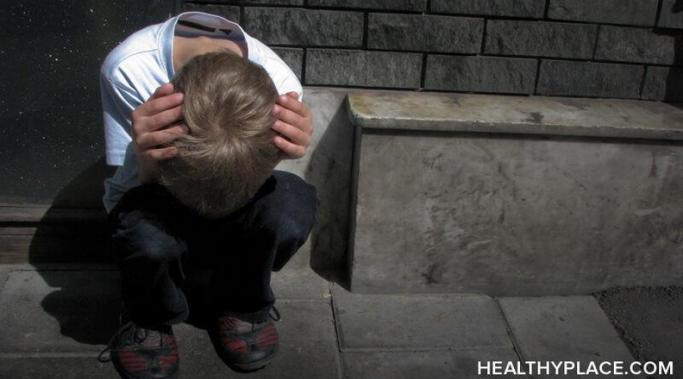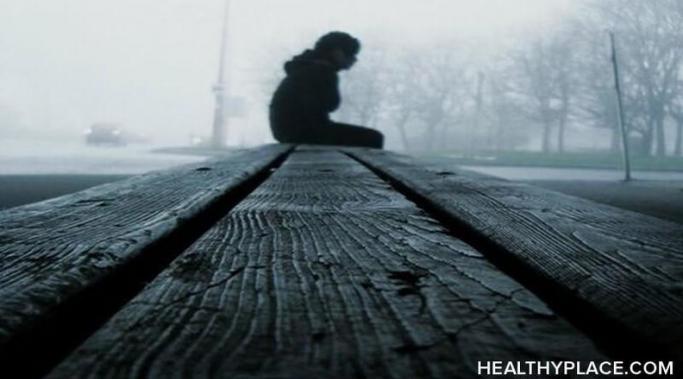There is a popular misconception that depression is the same thing as sadness. I understand why you might think this if you don't have experience with depression. Depression is sad; it's true. But depression is a lot of other things as well. It's a whole new echelon of sadness. It's sadness 2.0.
This morning is a good example - I woke up depressed and the experience is nothing like sadness.
Breaking Bipolar
I talk about bi-polar disorder. As in, two poles - mania/hypomania and depression. The name is extremely descriptive.
But as it turns out, there is something in the middle (besides normalcy, whatever that is); it's called a mixed mood episode. Mixed moods possess distinct characteristics of both depression and mania. Mixed moods severely impair judgement and carry a significant risk of suicide.
Recently a commenter asked how to tell her boyfriend about her bipolar disorder. Unfortunately, this commenter had negative past experiences in dealing with her bipolar disorder in relationships. In fact, people had broken up with her because of her disorder. A scene that is far too common in mental illness.
So, when is the right time to tell the person you're dating you have bipolar disorder?
If at first you don't succeed, failure may be your style.
Quentin Crisp
I think this quote is funny. It made me smile. So I posted it on Facebook and Twitter. People didn't seem to like that. People seemed to think it was a general statement of affairs and there was something wrong with it because it wasn't "positive." It wasn't "recovery focused."
But seriously, why is everything a serious statement on serious issues? Why is everything about our lives and our recovery and our mental illness?
Why can't we just laugh at ourselves?
In January the FDA had a meeting about whether electroconvulsive therapy (ECT) machines should be moved from the most dangerous category of medical devices (Class 3) to the less dangerous Class 2.
And the freak outs began.
I saw people screaming about how wrong it was and writing petitions and wanting to go to the FDA meeting to voice their opinion. I mostly ignored this issue because, well, I didn't care. I have so many important issues on my plate there just wasn't room for one more.
That is until I can across an article in Psychiatric Times by Charles H. Kellner, MD. Kellner explains why the move from Class 3 to Class 2 is important and its possible effect on patients.
What if you didn't have access to ECT anymore?
Hi. Thanks for joining us as we expose the biggest myths in mental illness. Today's myth: a bad childhood causes mental illness.
We all have gut reactions to information. It's the reaction when our stomach knots or tumbles, our breathing quickens or stops, our eyes light up or look down. It's the reaction we have before realizing we're having a reaction.
And gut reactions around mental illness can be powerful. The problem is, our gut reactions are so often wrong about mental illness and mental illness treatment.
Not long ago a commenter angrily stated he wanted double-blind, placebo-controlled studies for electroconvulsive therapy (ECT) conducted by an uninterested party. Myself, being diplomatic, I didn't say much to that, but really,
You've Got to Be Kidding Me.
This person clearly has not thought through the ethics involved.
Many people commented on the article I wrote about what a loved one can say to someone who has attempted suicide. One thing is clear from all the outreach - many people have attempted suicide and many people have survived. No one in this situation is alone.
But after a suicide attempt people invariably feel alone. They feel like a freak. They feel hurt and afraid. And when other people deny their suicide attempt, deny their pain, deny their mental illness, this makes things worse, not better.
Denial is keeping your loved one from getting better.
Recently, a man I have come to respect and care about attempted suicide. I am grateful he is still here to tell the tale. His suicide note was online and his pain was so evident it tore at my soul.
I was tremendously relieved to hear his friends had rescued him in time to save him. But I was then left with the problem as to what to say to this man. The last thing in the world I wanted to do was make the situation any more difficult for him.
What do you do when someone you care about just attempted suicide?



